Homeowners Insurance
Most Americans Are Concerned About Climate Change, but That Doesn't Mean They're Prepared for It
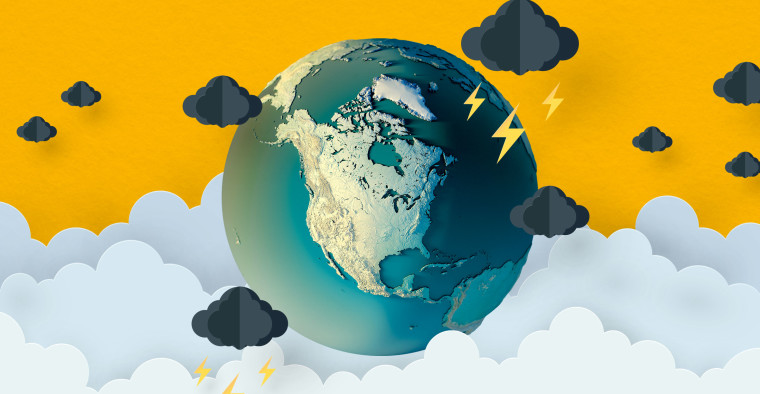
ValuePenguin has found that about 81% of people say they worry about climate change, and a similar number of people think their city will get warmer over the next five years. Two-thirds of people don't think enough is being done to combat the effects of climate change. However, data from other parts of the survey suggested that this widespread concern about the climate isn't influencing many people's decisions about money or housing.
Although over half of the people who worry about climate change own homes, up to 47% of all homeowners in this survey weren't fully confident that they have enough insurance to protect their property from a climate change-induced natural disaster. Furthermore, nearly 42% of homeowners say that they wouldn't pay more to insure their homes due to climate change.
The disconnect between climate change belief and behavior isn't just applicable to homeowners. Only a third of the non-homeowners we polled in this study indicated that concerns about climate change have affected their desire to buy a house. About 34% said they hesitated about buying a home because of the effects of climate change — in other words, nearly seven out of 10 people don't have the same reservations.
Key findings
- Almost half of all homeowners aren't sure that they have enough insurance coverage to protect their houses from a natural disaster brought about by climate change. In fact, only 44% factor in their area's disaster history when shopping for a home.
- Though a slight majority of homeowners are open to paying more to protect their homes against climate change, only 18% would pay an extra $500 or more per year to insure their homes against climate-induced disasters.
- While the majority of Americans do worry about climate change, about 66% of all non-homeowners in this study said that they haven't felt reservations about buying a new home because of climate change.
-
Non-homeowners in Texas, Arkansas, Oklahoma and Louisiana are most likely to consider the potential dangers of climate change when thinking about purchasing a home. Conversely, Midwestern homebuyers are the least likely to be worried about climate change.
- Among people who are skeptical that climate change is responsible for weather changes, about 36% still believe that their communities will get hotter in the next five years. Additionally, 40% of skeptics believe that not enough is being done about climate change.
At least 47% of homeowners aren't sure if they're adequately insured from a disaster stemming from climate change
Additionally, at least 60% acknowledge that climate change will probably cause their premiums to increase. As insurance prices already tend to be high in low-lying or coastal areas of the country, it does stand to reason that prices would continue to rise near the nation's coastlines as climate change causes the shorelines to creep inward and more places become susceptible to flooding. But it seems that many people are willing to wait for those topographical changes to cause insurance price increases to become mandatory: At least 42% of homeowners said they would not voluntarily increase the price of their insurance at all to purchase enough protection for climate-related natural disasters.
While this leaves a majority of homeowners who are open to spending more money on their homeowners insurance to address climate change risks, only 18% were willing to spend more than $500 extra on coverage. Typically, the price of insurance ($1,083) represents about 3.4% of the country's median income. Purchasing $500 of additional coverage would increase total insurance expenses to about 5.1% of median annual income. This hypothetical price increase of at least 2% may help explain the disconnect between worry and action that people feel.
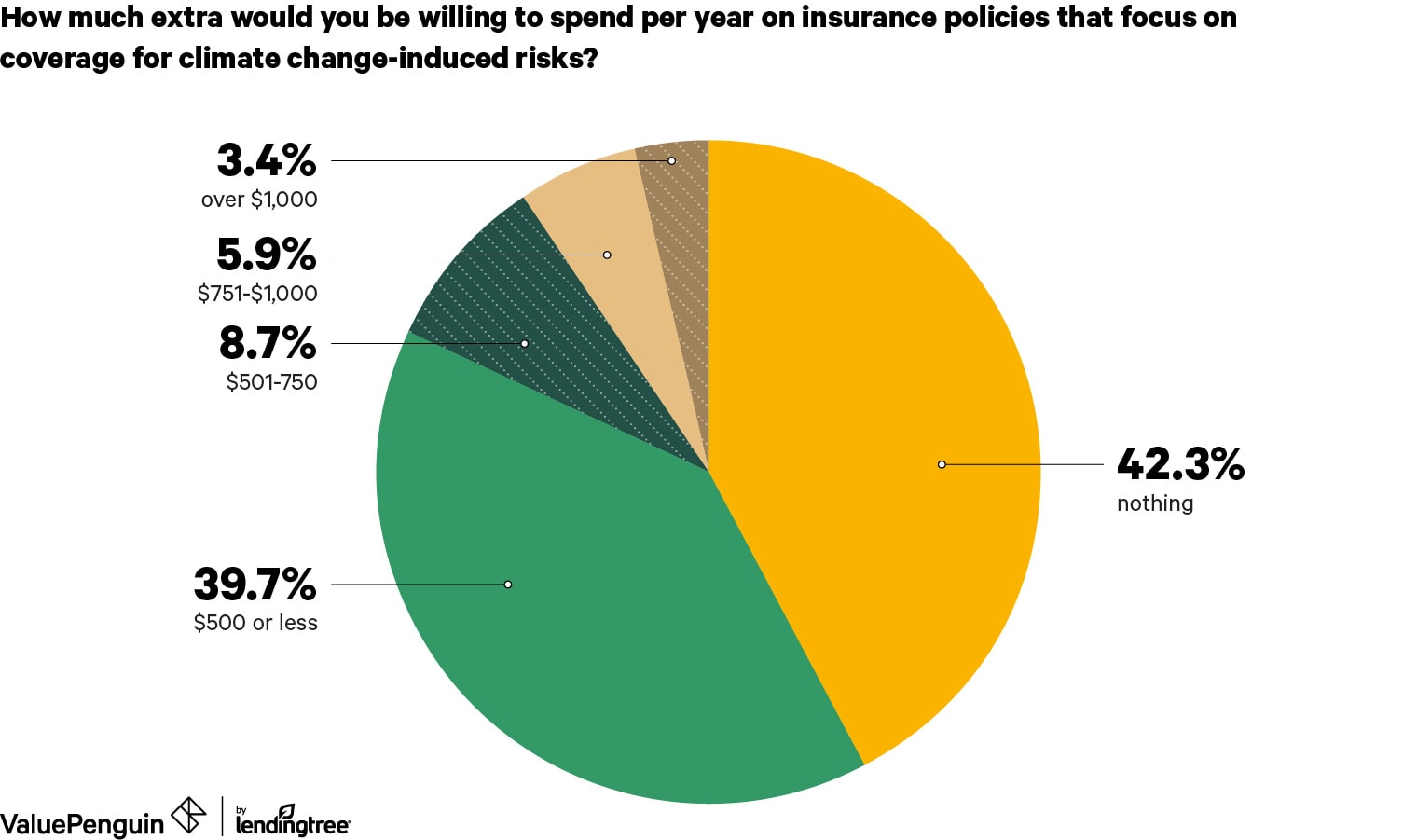
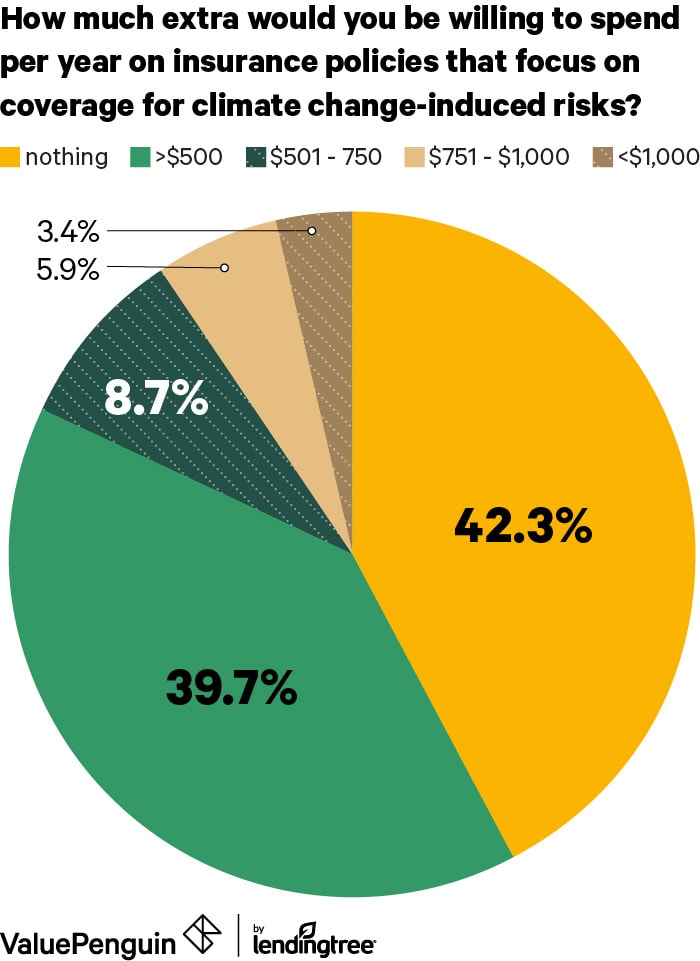
Up to 56% of the homeowners who responded didn't consider their area's history of natural disasters when purchasing their home, regardless of their views on climate change. Additionally, only 30% of all people worry that their homes will be impacted by a natural disaster in the next year. These answers seem to confirm the divide between people's anxieties and their actual responses to them.
Prospective homeowners in Texas, Louisiana, Oklahoma and Arkansas are most likely to disagree with each other about purchasing a home because of climate change
The data we analyzed tells a similar story for non-homeowners, too. People who don't own homes were asked whether climate change has made them hesitate about buying a house. Only 34% of people answered that concerns about climate change had made them balk, while 66% of people weren't affected.
We divided the people that responded to our survey into regions based on their location and determined that people most divided about how climate change would influence their decision to buy a home hailed from the west south central states. In Texas, Louisiana, Arkansas and Oklahoma, 44% of prospective homeowners have some fear about buying a house that's due to climate change, while 56% don't.
On the contrary, people from the Midwest are least likely to hesitate about purchasing a home because of climate change. In this survey, about 71% of the respondents from this area disagreed that climate change resulted in any hesitancy to buy a home, while less than a third of people agreed.
Although climate change would likely impact Midwesterners differently than coastal dwellers, people living in the middle of the country should still be aware of the possible damage that strengthening storms can pose to homes. Additionally, as the likelihood of strong storms increases, prices of homeowners insurance may rise, too.
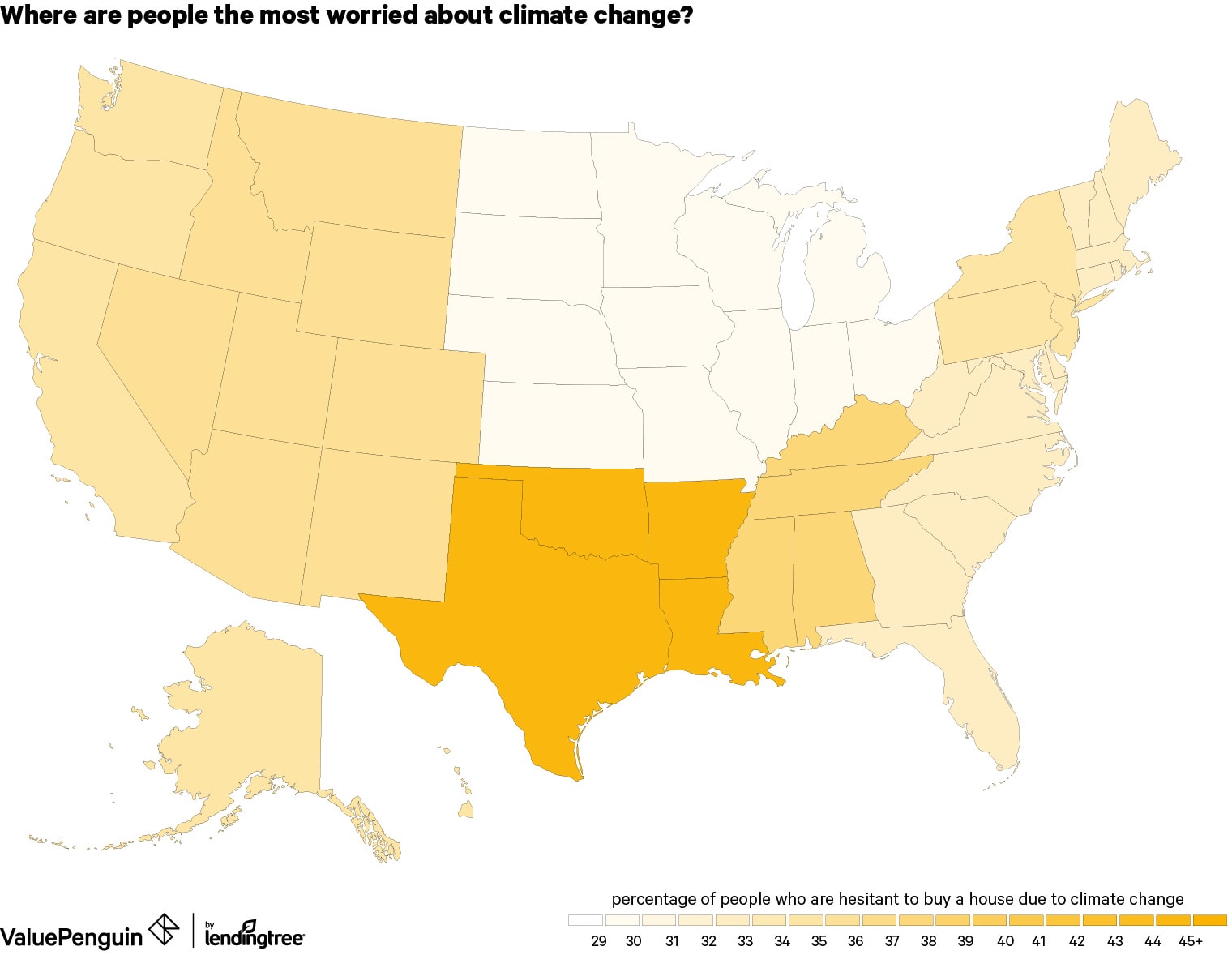
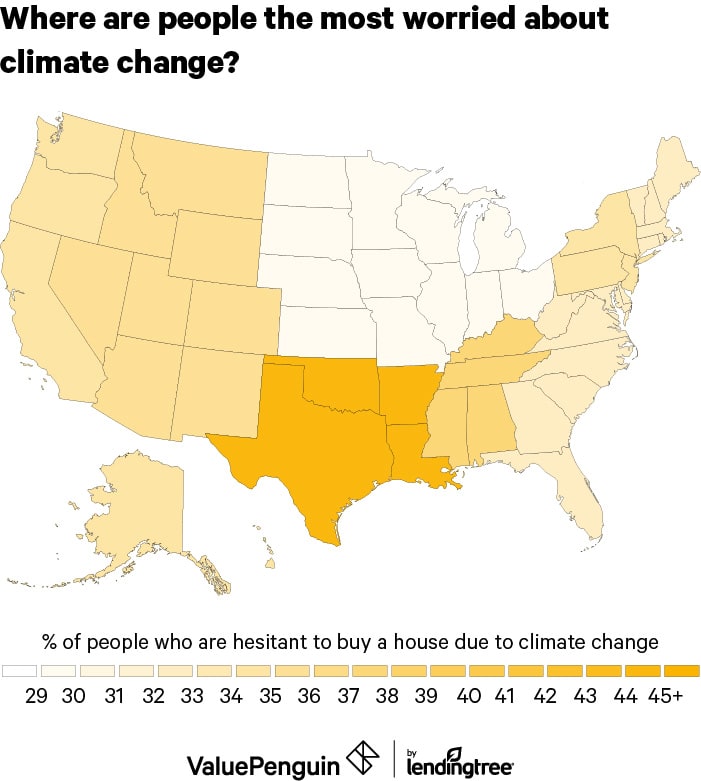
Respondents from both of these regions conveyed fears of global warming when asked which result of climate change is most concerning to them. Similarly, about 39% of all people surveyed agreed that "global warming" is the most worrying consequence of climate change. Only 2% of respondents declined to answer this question, which means that even skeptics of climate change harbor some concerns about it.
Overall, two thirds don't think that enough has been done to combat or prepare for the effects of climate change. Most people who answered that not enough has been done were from states that sit along the Atlantic coast. There, about 38% don't think enough action has been taken.
At least 41% of people who are skeptical of climate change's ties to severe weather believe more can be done to address its risks, but few act on these concerns
Nearly 17% of people surveyed don't think that climate change has any effect on the increased risk of severe weather. About one-fifth of the respondents don't worry at all about climate change or declined to answer the question. Yet, we found considerable disagreement amongst skeptics of climate change's relationship to severe weather.
Over 36% of these skeptics do think that their cities will experience hotter temperatures in the next five years. Furthermore, 41% don't think that enough has been done to address the risks presented by climate change. Of this percentage, as with the total pool of respondents, only a few bought coverage with climate change in mind or worried about it when buying their homes.
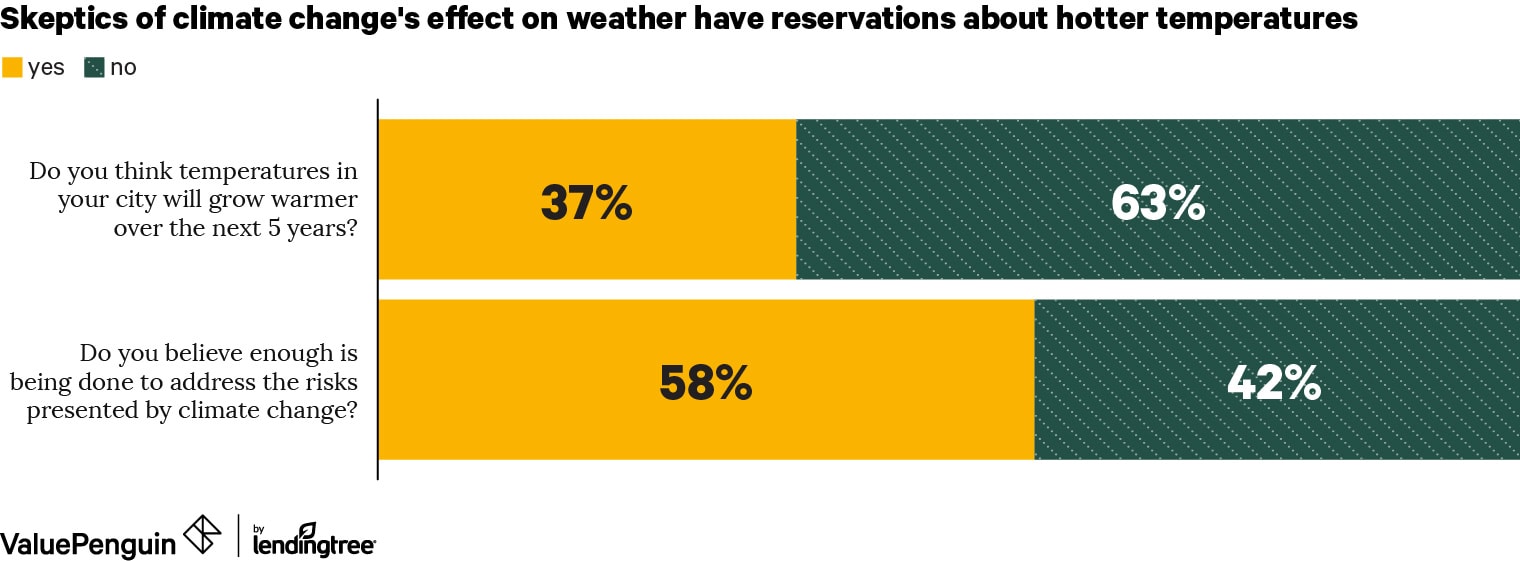
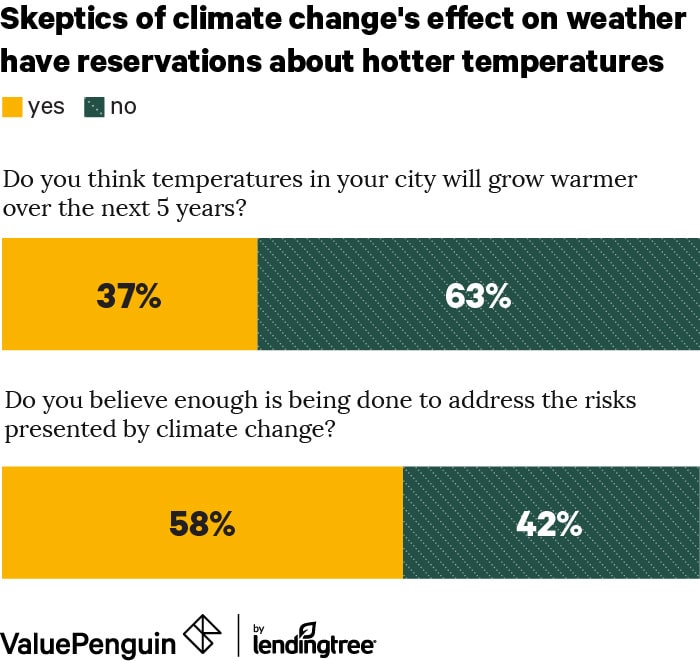
Generally, this data suggests there's a sizable minority who are receptive to ties between climate change and global warming, but who don't recognize that climate change has any effect on the severity of the weather.
Methodology
ValuePenguin by LendingTree commissioned Qualtrics to conduct an online survey of 1,070 homeowners in America, with the sample base proportioned to represent the general population. The survey was fielded in July 2019.
